#InMySkin, A Series Shot Virtually by Justin Wu
Highlighting Black identities through art, 9 brave individuals stripped down to lay their souls bare truth.

“Following the countless tragedies and cases of injustice against Black individuals in America and the rest of the world,” like many, Justin Wu, “felt heartbroken and enraged.”
Knowing he wanted to help, the director, photographer, and co-founder of the World Is In Our Hands, put those feelings into an immediate form of action; creating the beautiful series, #InMySkin. While Justin will never fully know the complexities of having Black skin, Wu does know what it means to show up for another community.
He explained, “Though I will never know what it is like or feel like to be Black, I know the importance of allyship because #BlackLivesMatter. As a visible minority and a member of the LGBTQ+ community, I have faced and continue to face racism and discrimination.” Justin continues, “I believe no matter how big or small our platforms are, we all have a responsibility to speak up and invoke positive change. So I created this series called #InMySkin.”
Thus, #InMySkin’s mission is to offer a platform to amplify Black voices. Specifically, offering making space for Black individuals to “express their perspective, and tell their truth, unedited and unredacted. This includes the anxiety, frustrations, and insecurities as a result of systemic anti-Black racism, discrimination, and intolerance.”
Partnering with long-time collaborative partner Yael Quint, the duo cast individuals across the spectrum to be a part of this series. The portraits —all of which were #ShotVirtually— strip away everything but the skin. This creative choice, “aim[s] to juxtapose those deep-seated emotions with the beauty of black skin and celebrate it,” Justin shared.
Below are stories laid bare from an activist, author, actor, editor, entrepreneur, and models — 9 individuals who all share the commonality of being Black. But, with vastly different experiences, upbringings, and upheavals, the featured stories are just a start to a series and conversation that will continue to evolve as more voices, including yours, join in.
Highlighting Black identities through art, view the #InMySkin series below:
Aweng Ade-Chuol, model
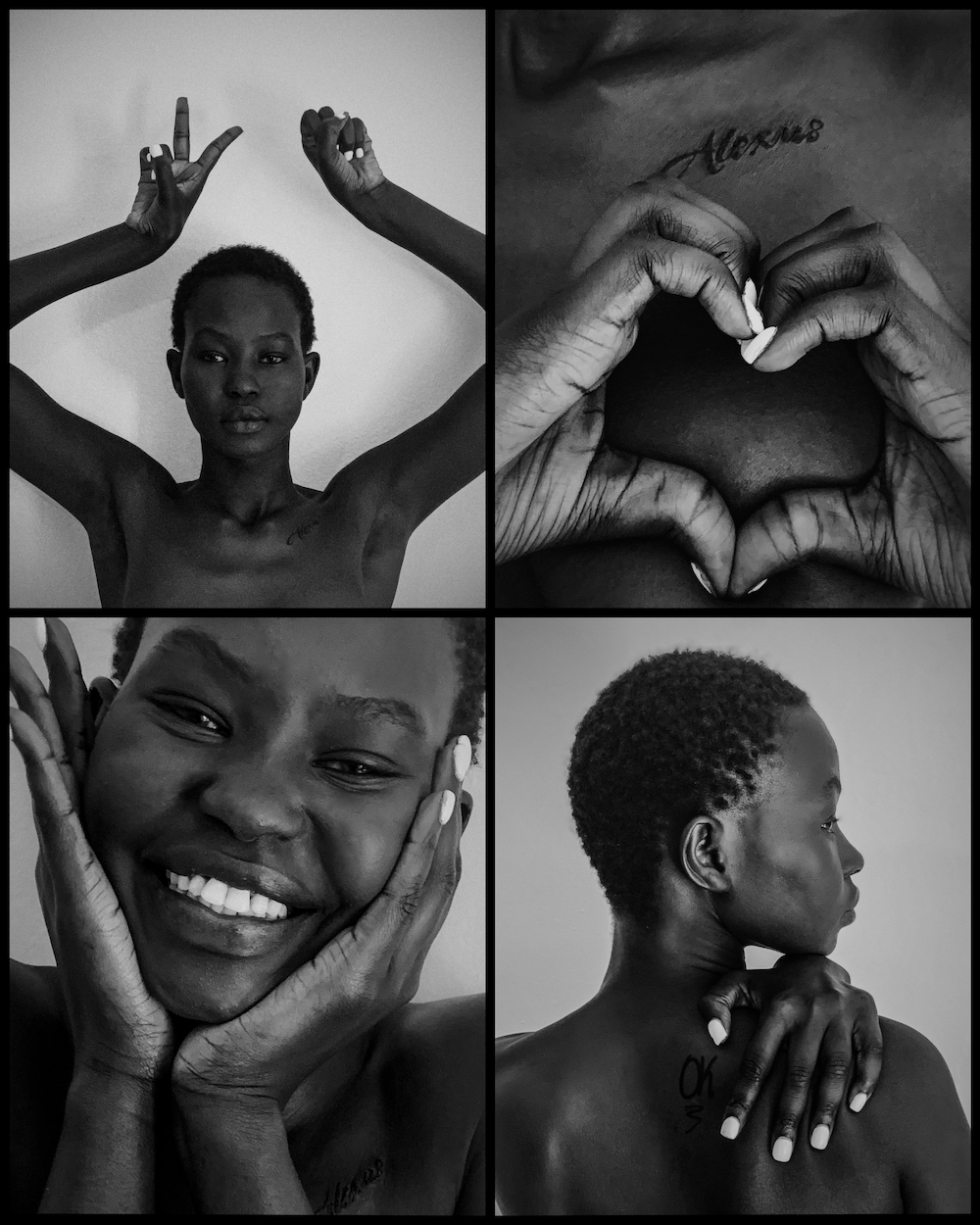
Being a black woman in the LGBTQ is an extremely unique experience, one wants to celebrate the power that being BLACK & an LGBT has. But one is in constant fear as being both of those things is also deemed as dangerous. My personal experience with my black Identity & my queerness has been unique in its own way, I am privileged enough to be raised in a family and community that wanted to enhance who I am on the bone.
I wanted to write something that society is not right now, which is OKAY. The black experience politically has never been privileged enough to be okay. The Black-Queer life has never been OKAY in the eyes of politics and way of life. And writing ‘OKAY’, particularly on my back, added a very eerie feeling of confusion.
My advice to black youth and the next generation of black females is that you are the power. You are the source for art, music and politics. You are the front face. You are also allowed to be MAD. We have a LOT to be mad about- we have generations of anger to dissect. And it is okay to be MAD, ANGRY and SAD- but in the end- know that you are the blueprint for everything.
Chloe McBKenzie, author
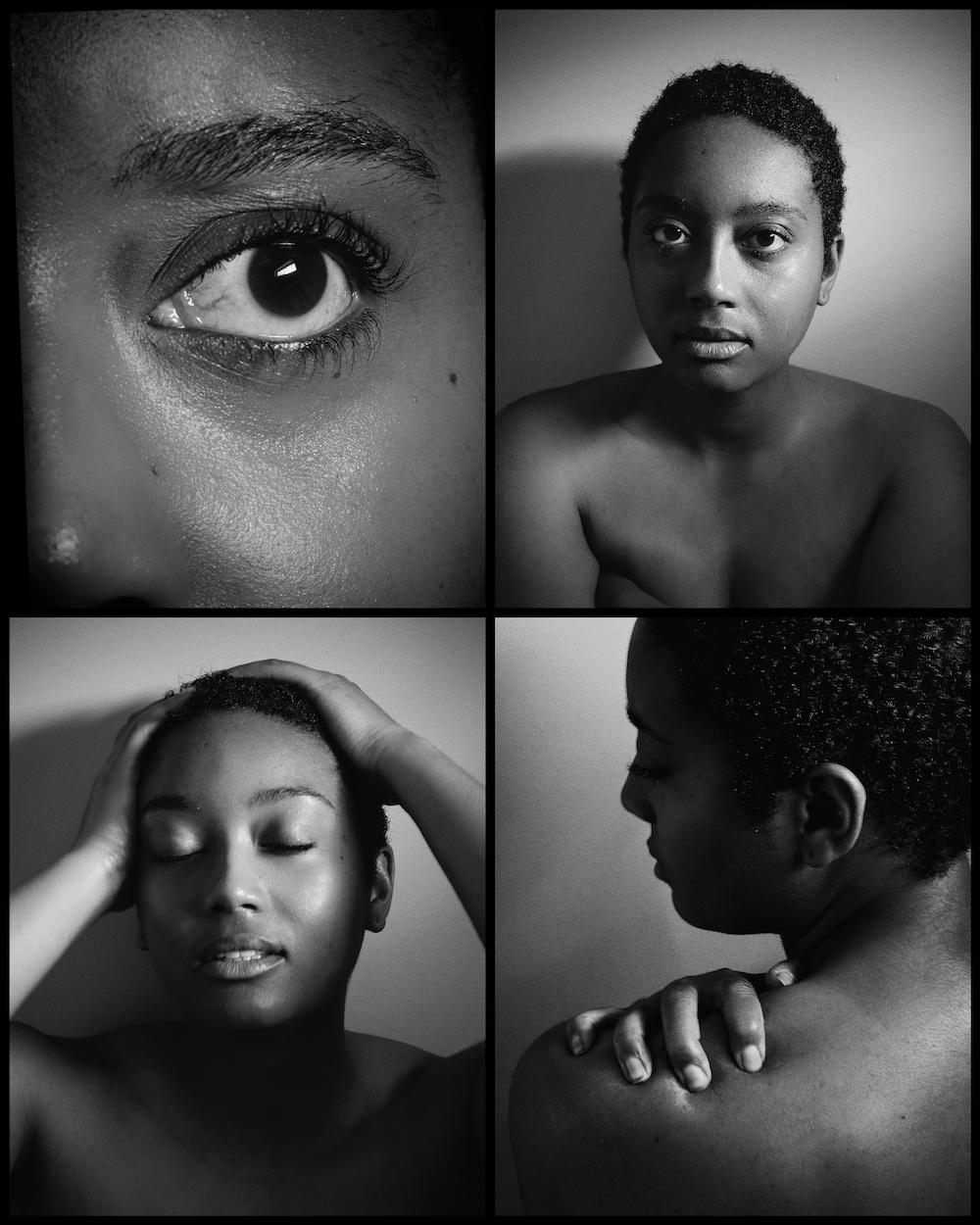
I spent pretty much all of my childhood and early adulthood trying to reject my blackness. If I wasn’t Black, then I could really belong. It was cool to be in Black culture, but not Black. I remember distinctly my soccer teammates thought I was disgusting and gross because I didn’t wash my hair every day. So what did I do? I started washing and straightening my hair every day. When people asked “What I was?”, meaning what race was I, I was very quick to answer mixed. I’m more Black than anything, but I do have some European ancestors. My great grandparents were slaves. I carry that history within me. My sense of wanting to belong proved that. That’s why I felt it was so necessary to name my nonprofit BlackFem. I wanted it to be me in my most blickity-blackness. I love my hair now. I love my skin now. I love my Blackness.
We cannot really live the life we deserve until we are liberated. I fight because we aren’t there yet. My privilege has afforded me the opportunity to live more than others. Because my sisters, brothers and siblings are not even as free as I am, I fight! I will not stop fighting, except for my regularly scheduled self-care (which is also a form of fighting). If we aren’t fighting for those who aren’t liberated, we are a part of the problem.
I am hopeful we will begin to deal with inner chaos within us, the parts of ourselves. I’m hopeful we will have the opportunity to heal our relationships with money and wealth and the histories and experiences we carry with us. Real healing. Which requires real upheaval. I hope oppressors will begin to take responsibility for their harm and realize what they need to do to recover from their sickness. We spend so much time talking about what we need to do, what we’ve suffered from. That’s important. AND, we also need to acknowledge how sick those who stole from us, murdered us, exploited us, they really are. As we continue to fight and heal from our fighting, we are demanding, or at the very least, demonstrating the work they need to do in our resistance and existence.
Dania Curvy, editor
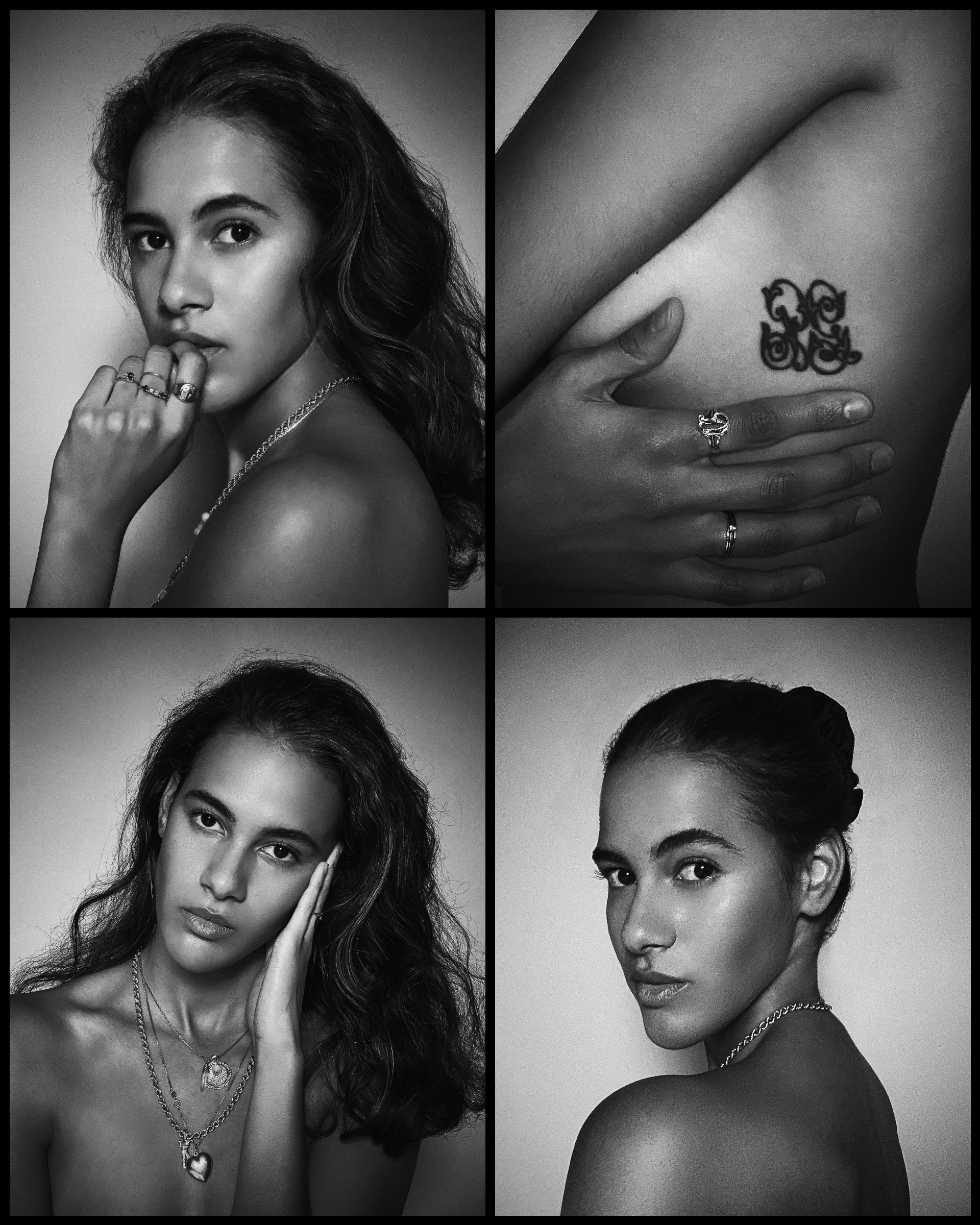
No one in my family really embraced Black culture so it was very difficult for me to do so growing up. I am both Black, and afro-Cuban with white, Asian, and Native American in the mix. Predominantly, Black on my paternal side, and Afro-Cuban on my maternal side. I grew up in a very white and affluent area and attended a Catholic Private School in New Jersey. However, my family was middle-class.
I was always the tallest, the brownest, and had big frizzy curly hair—to put it plainly, I stood out like a sore thumb. Kids always wanted to touch my crunchy gel-engulfed curls; back then, I didn’t understand why it made me feel so violated. I was overcome by the white gaze which constantly made me feel uneasy.
During high school, it got a little worse. Kids would say, “You’re Cuban; you’re not black, right?” They had discussions behind my back. In part, that was true, I am Cuban, but I was always too afraid of what would have happened if I said I was Black, too. I’m not proud of not speaking my truth, but I’ve forgiven myself for not being strong enough to do so.
It wasn’t until I attended college in New York City, that I made friends with other black and brown people… it changed my life. I finally became comfortable in my own skin. I no longer felt out of place. I began to wear my hair curly, no one made it seem that being Black was shameful but instead celebrated. I finally didn’t feel the need to explain or justify why I look the way I did.
Because I am mixed, I never felt truly accepted by the Black Community because I was too light-skinned or the Latinx community because my Spanish was never top-notch. It took a long time for me to figure out where I “belong.” And that is…everywhere. I, nor any mixed POC shouldn’t need to stick to one community to feel safe or accepted.
And when people asked, “What are you?” (A question that still triggers me to this day), I am no longer afraid to speak up.
Donte Colley, creator
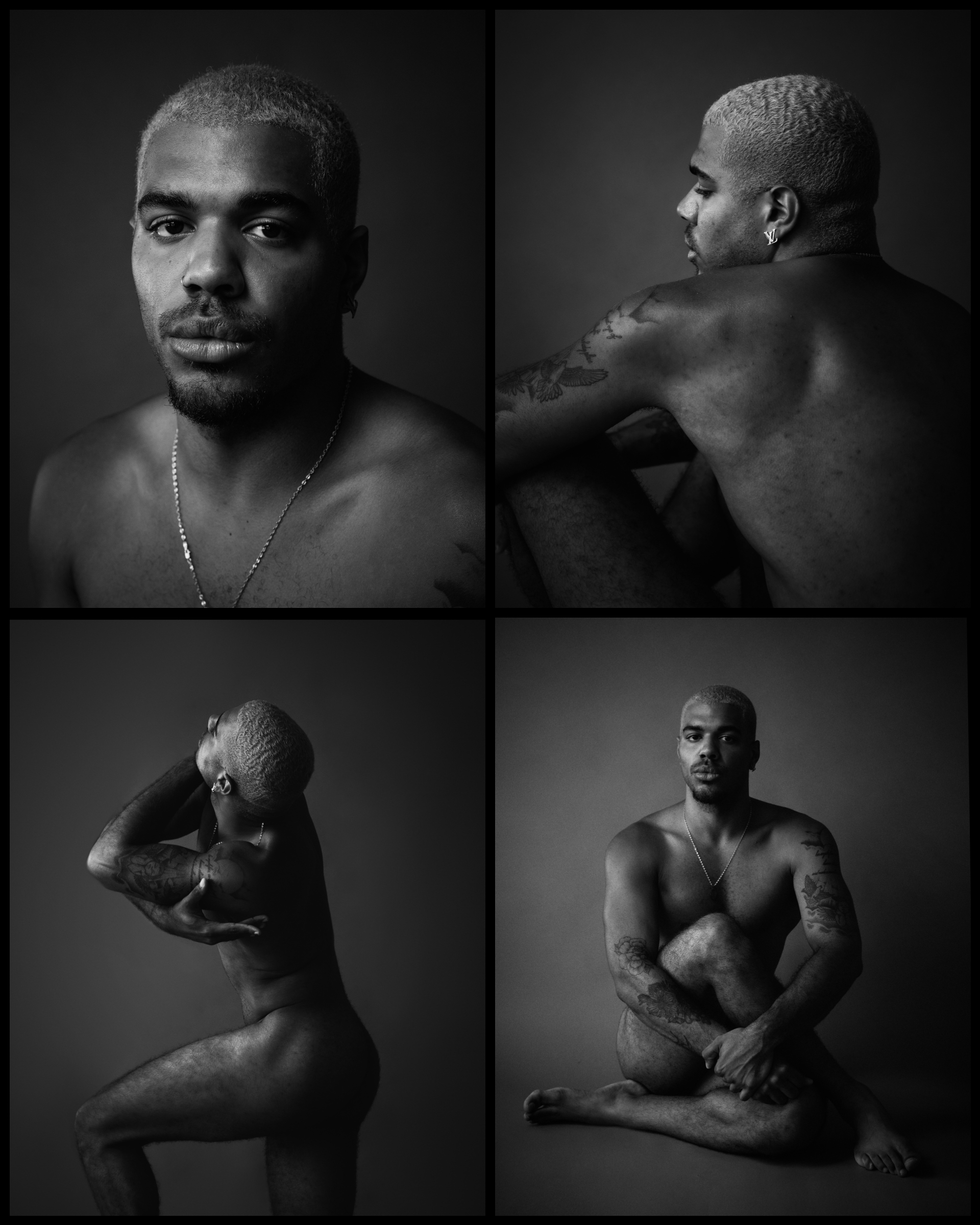
Life being black is all I know.
There isn’t any other option. We shouldn’t even have to fight. Black people are exhausted. Indigenous people are exhausted. However, we know what we deserve and how we are treated. Systemically and generationally the obstacles have been pinned against us for far too long.
There is so much work to be done. Our voices need to be heard. Black and Indigenous people shouldn’t have to fear their lives every single day of being murdered at the hands of police or simply just by walking down the street. I hope every single person realizes that they do have a platform. Big or small, your voice matters.
Kristen Noel Crawley, entrepreneur & model
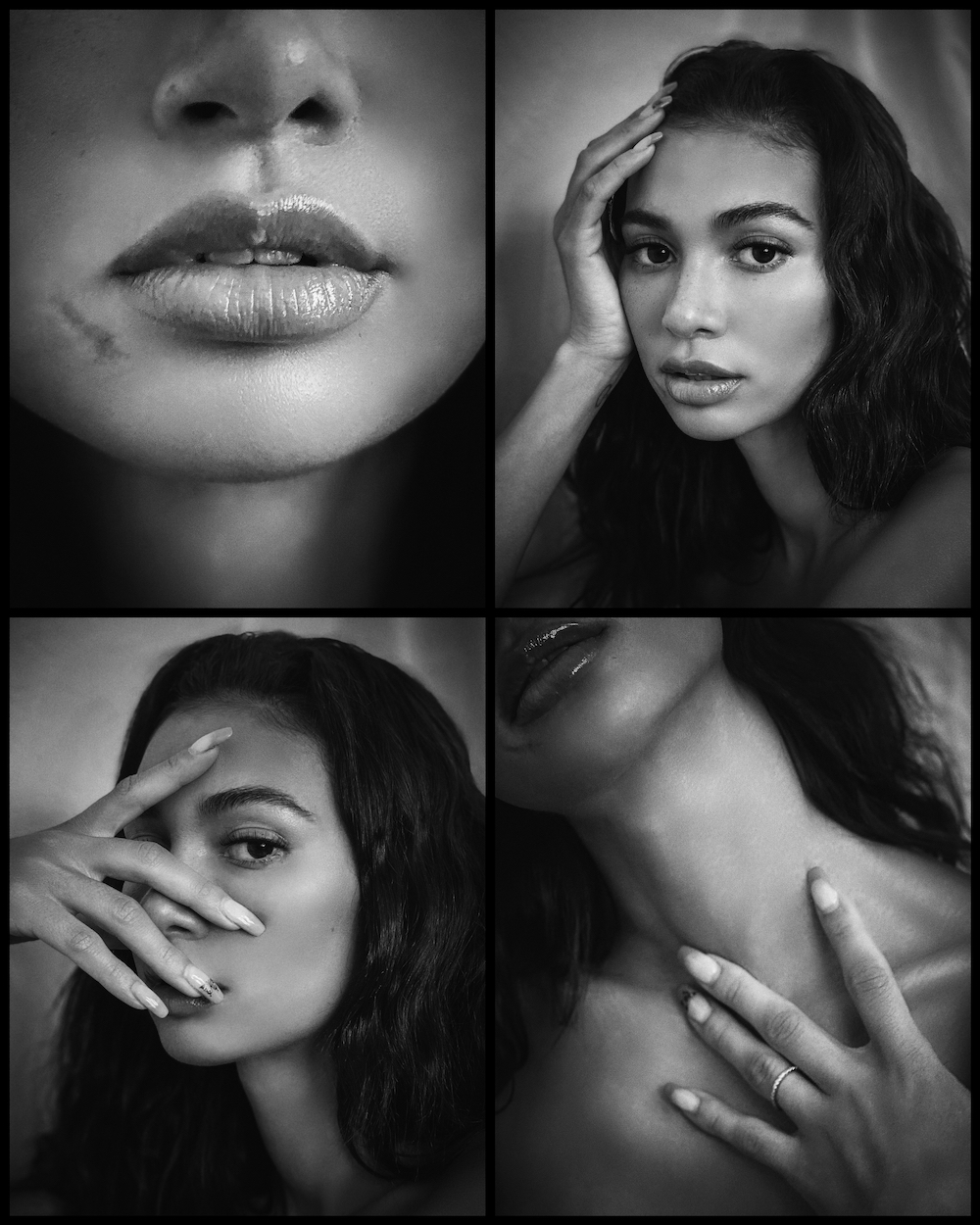
Growing up mixed-race was challenging, mainly because I never felt like I belonged. There wasn’t really a space for someone like me in my small town, and I never had any role models to look up to who owned their mixed heritage. People just want to categorize you as one thing or another, but I’ve always felt like both of my backgrounds speak to who I am as an individual.
I find the neck & clavicle area very flattering yet vulnerable at the same time. I wanted to highlight areas of my body that make me feel confident and at ease. It’s brave to expose those parts of yourself and can lead to a very intimate shot in the end. I felt there was something sensual about drawing a line with my hand and incorporating it in the pose.
As a child, I was extremely self-conscious about my scar, which I got after a freak accident at ten years old. At the time of the event, I had to have 30 stitches in my face, and for a long time after it was the thing I hated most about myself. As I’ve gotten older and learned to embrace imperfection, I feel that my scar is something that makes me unique. The road to accepting these slight flaws about myself has helped me to cherish them even more.
Really just own the skin you’re in and know that you have something the whole world wants. Our look, our style, and our culture have paved the way for so much of what we see in the mainstream nowadays. There is strength in our influence as black women on society and now is the time for us to move away from exploitation and more toward ownership.
Malik Lindo, model
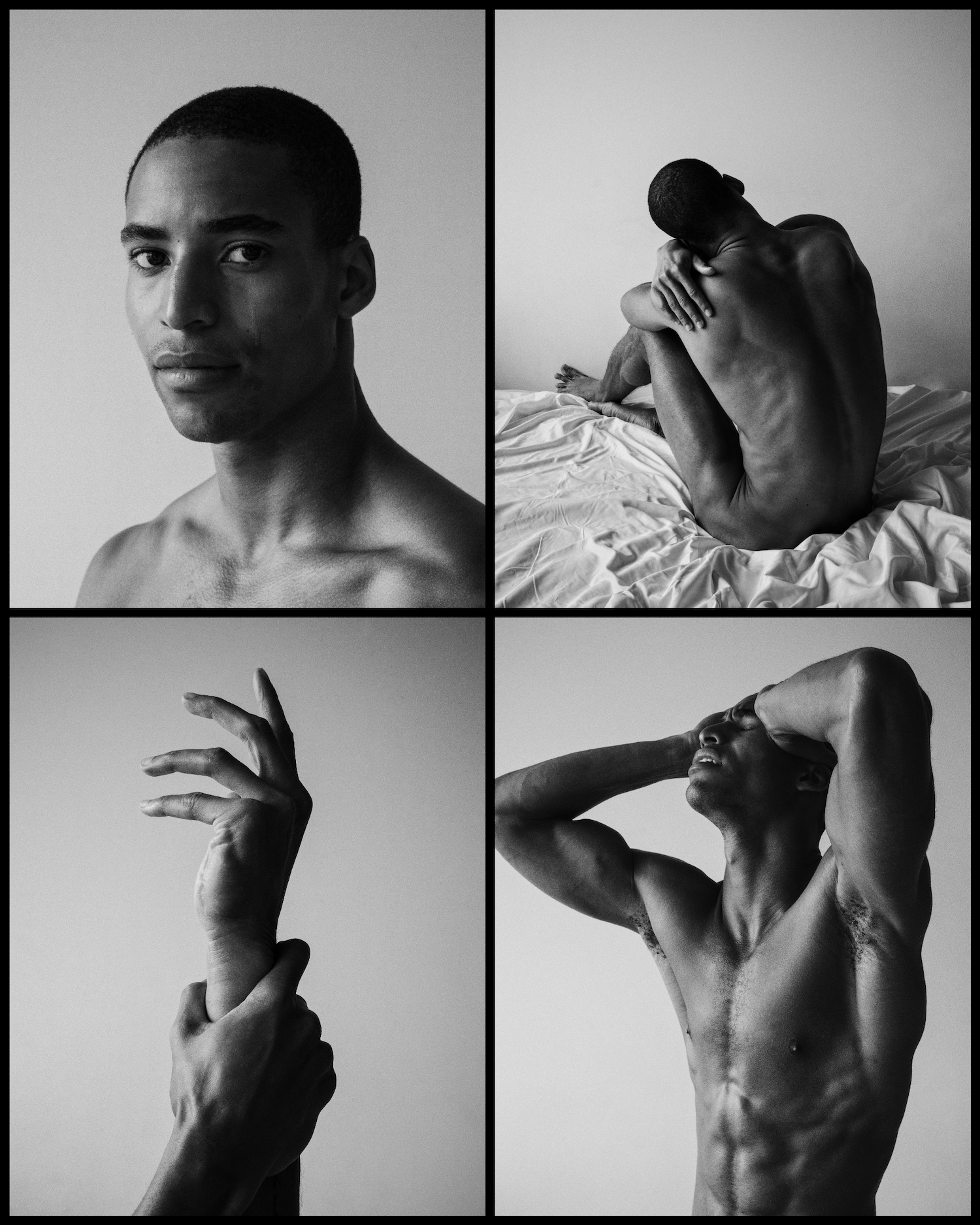
Life being black is like, growing up and being told that you will have to work 10 times harder than your white counterparts in order to receive the same recognition. Being black is like, being made fun of for being articulate, or sounding like a “white person”. Being black is being nervous every time you’re around police, even when you’ve done nothing wrong, worried that you might be “mistaken” for someone else and arrested, or even harmed. Being black is feeling sick every time a white person uses the N-word to greet you, or sings it in a song, and debating whether you should say something, or just try and ignore it because you don’t think they would understand why that word is so offensive when it comes out of your mouth. But being black is also beautiful, being black is something to be proud of, and most of all being black is an opportunity to show the world that just because our skin might be darker than yours, we are still just as capable of doing incredible things, and assisting in making this world a better place, for all.
The reason we fight is simple. Black people, Brown people, Hispanic people, Asian people, etc. are all human beings, the only differences they have between them are the color of their skin. One thing they all have in common however is that statistically they are treated as lesser than white people all over the world, but ESPECIALLY in America.
We need EVERYONE to stand up against this inequality so that incidents like what happened to George Floyd don’t continue to happen. So that a police officer will think twice before profiling someone because of their race, because he knows that is WRONG. And so that even though racism might be an uncomfortable topic, it is no longer a conversation that people are afraid to have.
I hope that the future generations won’t need to protest in order to demand equality in this world. And I hope that if they feel the need to, that the governments and people in power will listen, and take action and change the laws that would allow such inequality to exist in the first place.
I hope that these protests bring justice in the George Floyd case, I hope that ALL 4 officers are charged with his murder, and lastly, I hope that this will be an example to everyone that we are all one people, and in times of injustice it is important that we all come together to stand up for each other and our human rights.
Samirah, model & activist
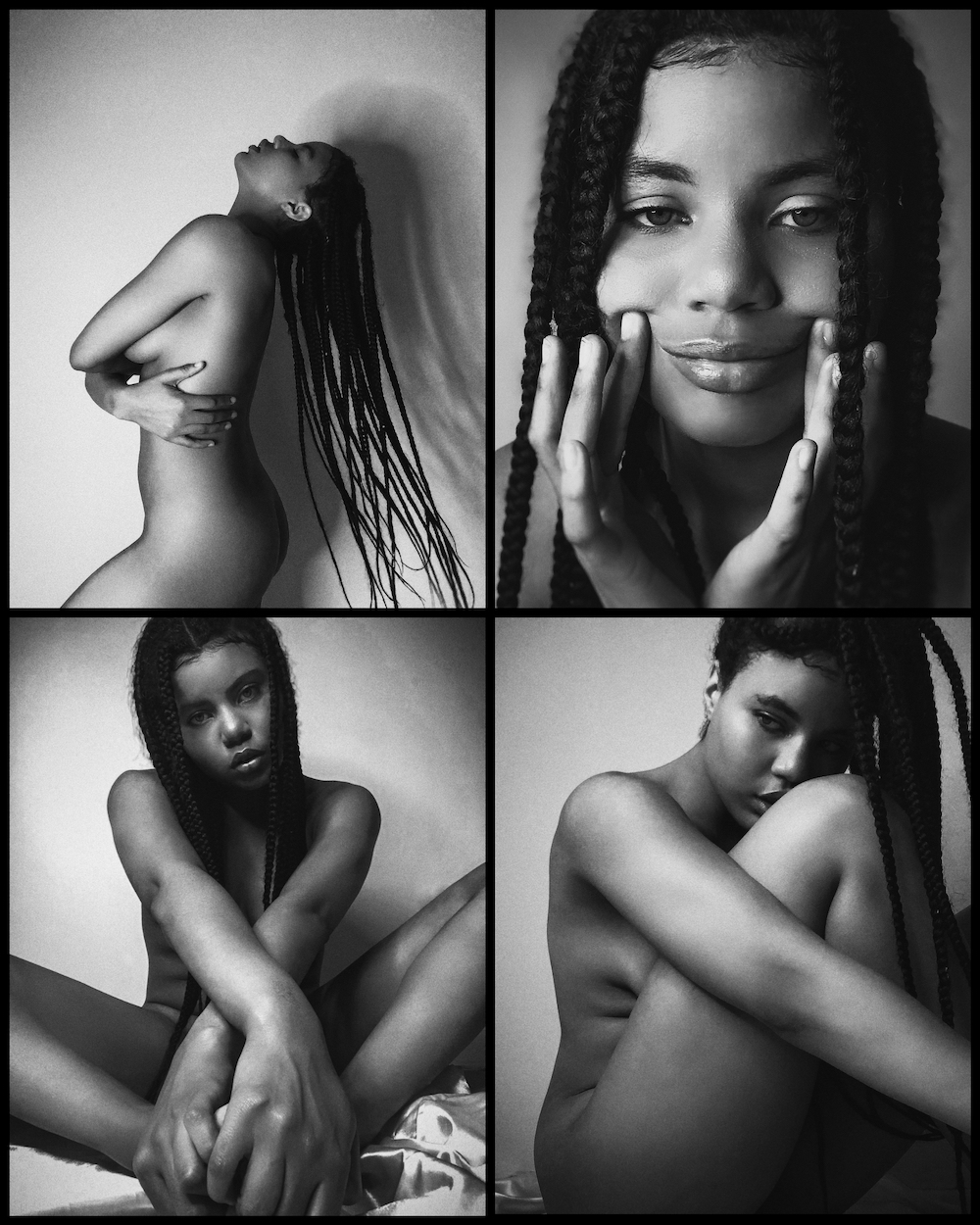
Life being black is a constant struggle of accepting the world is obsessed with your culture but not your survival.
Katori Hall, a black playwright once wrote in her play The mountaintop “the black women is the mule of this world”, and it’s true more than ever.
I’m always fighting for the simple point that Black lives matter and that includes Black Trans lives and Black LGBTQ lives and Black Disability Visibility. I fight for the unification of my people and the representation of all marginalized folks.
You must fight with me because it’s been said time and time again-black women are tired. We are tired of the folks’ eyes glazing over when we express our pain. The microaggressions begin before the point is proven. Real allies have to use your privilege to advocate because often their bias won’t let them hear black or brown folks.
I hope for the next generation an optimistic eradication of systematic racism and oppression. I hope for a generation that sees the other as one. I hope the next generation welcomes conversation and can have healthy constructive discourse.
I hope for this protest to keep going strong. We have the world’s attention, but we need more than street names. We need human rights.
Taelor Thein, model
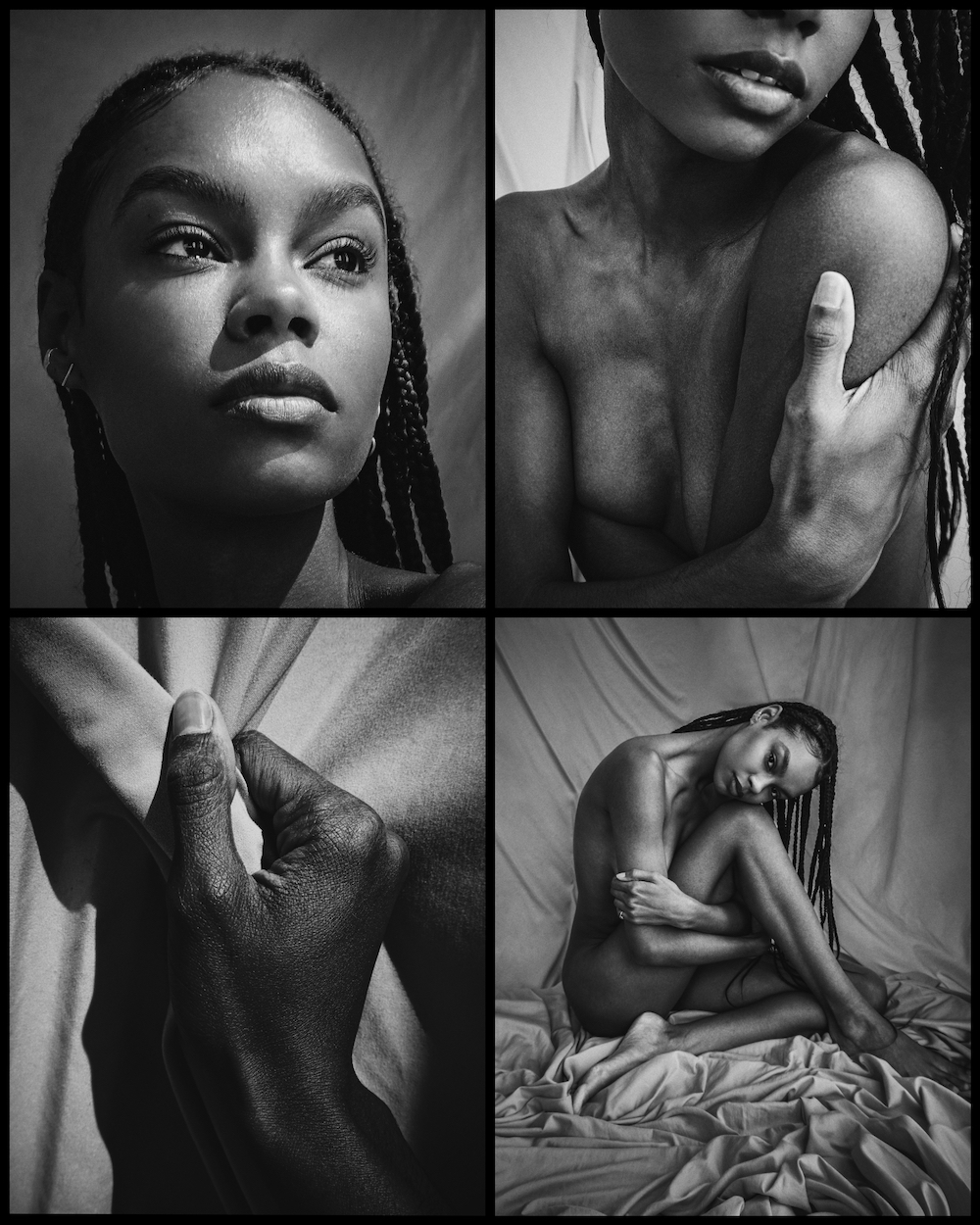
I am a woman made up of both black and white- finding out later my heritage is German, Scottish, Irish, and Cameroonian. I grew up in Iowa as did generations before me. Although the Midwest is great, the color of my skin made me different. I was raised predominately by my amazing, protective white mother, as my father left at six years old without regular contact. While I didn’t realize it at the time, this led many to feel sorry for my mom and agree with the already in place prejudice of society regarding black men. While I never faced any direct acts of racism, I am aware of the many acts of micro-aggression that took place during my upbringing and still continue today; for instance, I think specifically of a time being picked up from school and kids doubting that my mom could really be my mom. I remember being confused and my confusion didn’t stop there. Why did the one other black girl in my school bully me because I had white friends? Did she think I abandoned her? Why did I have to choose which race to hang out with? My mom and I were frequently approached by people commending her for being part of the “big sister program”, only to be immediately corrected by my proud mother with “No she came from me!”. She reinforced the good in me and always made sure I was always ready to stand up to any negativity or prejudice that I might face. Later, I felt it necessary to ask my friends if their parents knew I was black before going to their house. I didn’t want to see the shock on their faces if they came home from work and there was a black girl in their living room. I became increasingly shy and quiet in any public environment. I once tried to overcome my anxiety at age 12 when I went in to order a sandwich as my mom pumped gas – as I ordered, the woman acted as if I was incoherent and refused to make me a sandwich. After walking out empty-handed, my mom went in to ask why she didn’t make me the sandwich and the woman responded that “kids like me” had been ordering sandwiches and not paying for them. Kids like me? Black kids? Identified as black, but being raised in a predominately white family, frequent thoughts of mine growing up were: Where do I fit in? How do I act? Do they like me? Will they be accepting? Don’t play to the stereotypes; Don’t be opinionated. Don’t be loud. Don’t be reactive. Don’t be difficult. Don’t look suspicious. I don’t want to cause attention to myself. Limit social interaction in case you might be misunderstood or profiled. Maybe if I fade into the background, they’ll look past me and won’t notice that I’m different. Maybe if I have white friends people will be more accepting of me- I’ll be seen as one of them. If I’m in the company of someone white, I won’t have any problems. If I straighten my hair, I’ll belong. If I remain silent, they won’t see me as being difficult. I think that in my adult life, no longer being protected by my white mom from ignorance, I just tried to limit the opportunity for such acts of prejudice to happen to me. That constant conscious awareness that I was black, that feeling that someone may treat me differently because the color of my skin created a feeling of anxiety I carried into social situations. I just wanted to hide and, at best, fit in. After thinking this way my whole life, I’m now trying to program myself differently- to embrace all that I am and that I am strong and have a voice that should be heard.
I must fight to give my sister the chance to be who she wants to be. To not change for anyone- no matter who she’s around. She is special. Anyone reading knows you are special. Know you are worthy. Everyone deserves to be seen as the person they are not grouped into a box or category.
The generations after us deserve and have the right to not walk around with anxiety and fear of what may happen or what people already think of them because of the color of their skin. They deserve to be free of doubt, filled with joy and happiness, and certainty that they are enough.
Yvesmark Chery, model
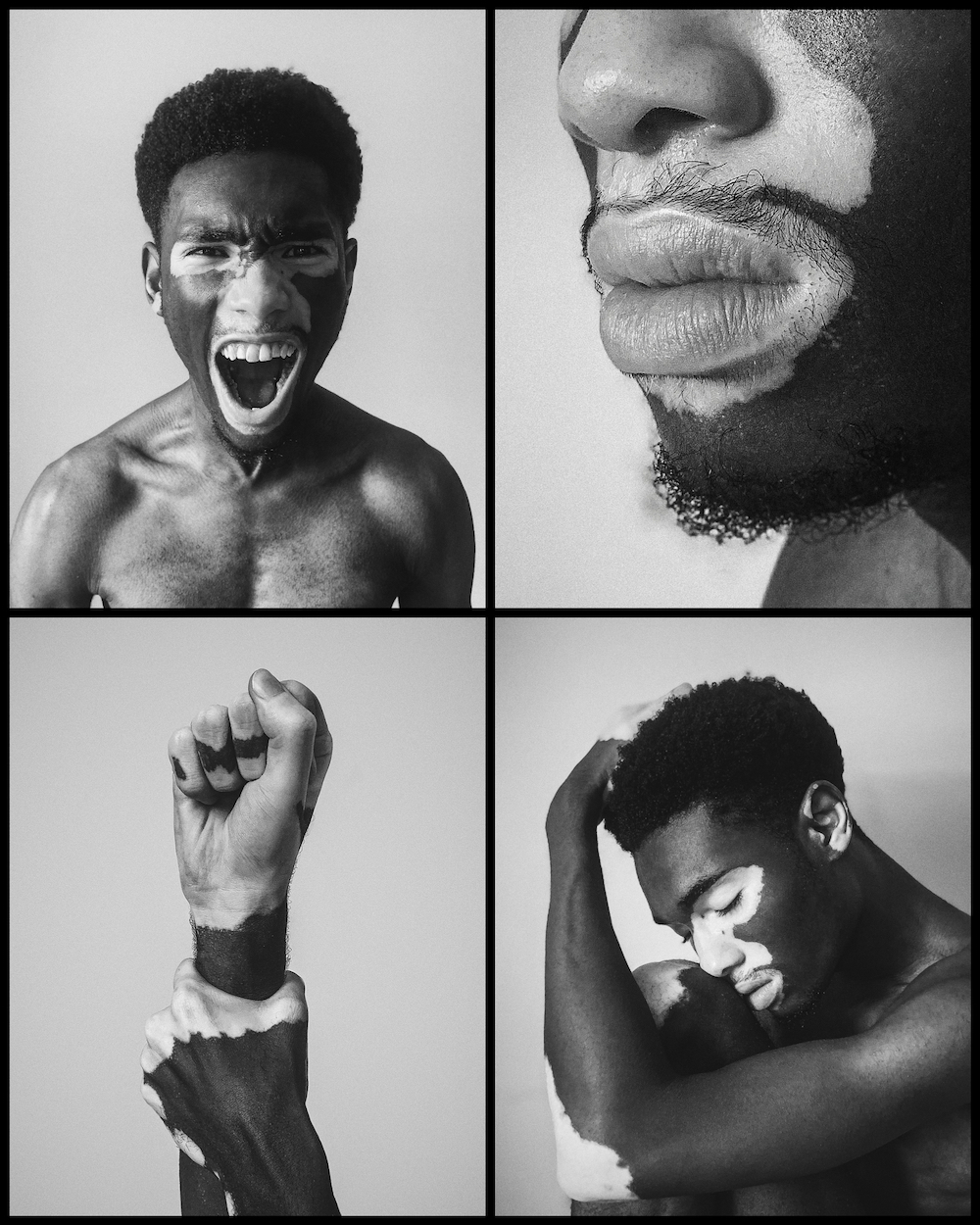
Life as a black man with Vitiligo has had its own set of challenges. There was a point in time where I wanted my skin to look “normal.” However, the “normal” that I wanted still made me a target in the eyes of the system. Growing up I was told, “don’t walk in the streets with my hoodie on, don’t touch anything I’m not buying, don’t leave the house without an ID, etc.” It’s sad that these are the precautions that were needed so that I could live to see another day. Enough is enough and changes in the systems needs to happen.
I fight because the system is built on principles to target minorities. I fight so my children will not have to. It was best said by Martin Luther King Jr, “injustice anywhere is a threat to justice everywhere” and that is why we must all fight.
I hope that the next generation is not fighting the same battles we are fighting today. But, we are facing different challenges that are moving humanity towards a better tomorrow. I hope that equal treatment for all will finally happen and that the current corrupt system is completely reformed. But, until then, No Justice No Peace.
Discover More
